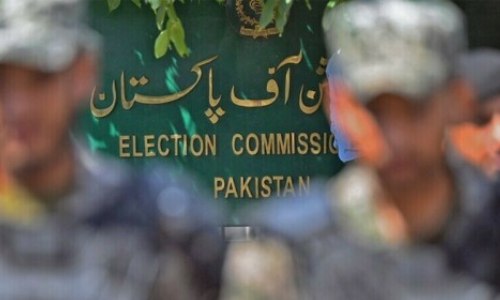ISLAMABAD: The Election Commission of Pakistan (ECP) issued a comprehensive three-page order on Friday, underlining the indispensable requirement for fresh delimitation of constituencies and the revision of electoral rolls.
The ECP’s announcement comes in response to mounting critiques from political parties, legal experts, and civil society, centering on the adherence to the 90-day timeframe for conducting elections following the dissolution of national and provincial assemblies.
In its statement, the electoral watchdog emphasized that ensuring an accurate representation of voters, candidates, and political entities within parliament and provincial assemblies stands as a fundamental principle of constitutional democracy, as envisaged by the Constitution.
Referring to its recent series of meetings regarding the digital census and upcoming general elections, the ECP stated that the accurate representation of voters, candidates, and political groups is paramount, serving as a bedrock principle of democratic governance. The commission acknowledged its responsibility, as stipulated by Article 219(a) of the Constitution, to prepare electoral rolls for elections to the National Assembly, provincial assemblies, and local governments. Additionally, it underscored the necessity to periodically revise these rolls to ensure their accuracy and relevance.
The commission’s order spotlighted the evolving demographic landscape following the publication of the 7th Population Census, which witnessed a notable increase in census blocks and shifts in their boundaries. Consequently, the ECP deemed the revision and updating of electoral rolls imperative to align registered voters with the new census data.
The significance of providing genuine representation to the electorate was reiterated by the ECP, emphasizing that this duty is not only a constitutional obligation in accordance with Article 218(3), but also a fundamental right for contesting candidates, political parties, and the electorate at large.
Citing legal precedents, the ECP highlighted the rulings of the Supreme Court, including cases such as Worker’s Party (PLD 2012 SC 681), Benazir Bhutto Vs. Federation of Pakistan (PLD 1988 SC 416), and Ch. Nasir Iqbal Vs. Federation of Pakistan (PLD 2014 SC 72). These cases affirmed that the rights to vote, contest elections, and establish political parties are guaranteed as fundamental rights under the Constitution.
The order stressed that without the crucial steps of fresh constituency delimitation and updated electoral rolls, the authentic representation of voters, contesting candidates, and political parties within the parliament and provincial assemblies would remain elusive, thus undermining the core tenets of constitutional democracy.
Recognizing its role, the ECP invoked Article 218(3) of the Constitution, which empowers it to organize and conduct elections and institute necessary measures to ensure fairness, honesty, and compliance with the law while preventing corrupt practices.
Referring to Section 17(2) of the Elections Act, 2017, the ECP elucidated that constituency delimitation is to be carried out following each officially published census. In this context, it pointed to the recent 7th Population And Housing Census (digital census) conducted by the Pakistan Bureau of Statistics on August 7, 2023.
To address the issue of delimitation ahead of the impending general elections, the commission meticulously examined constitutional provisions, including Articles 17, 218(3), 219, 222(b), 224(2), 254, alongside section 17(2) of the Elections Act 2017, as well as pertinent court judgments. The commission’s review concluded that the scope of Article 218(3) encompasses not only the appointment of election officials but also necessitates the preparation of updated Electoral Rolls and delimitation of constituencies.
Given the significant population changes observed at the district level as a result of the latest census, the ECP instructed its office to furnish details of alterations in constituencies and newly established districts. Stressing the imperative nature of delimitation and accurate electoral rolls after each population census, the commission affirmed that these actions are prerequisites for conducting elections.
In its final decision, the ECP unequivocally stated that the fresh delimitation of constituencies based on the most recent census, as outlined in section 17(2) of the Elections Act 2017, is an obligatory legal requirement. This action is deemed necessary to fulfill the commission’s duty under Article 218(3) of the Constitution and to guarantee the genuine representation of the electorate, political parties, and contesting candidates in alignment with their fundamental rights as guaranteed by Article 17(2) of the Constitution. The commission concluded by directing its office to proceed with necessary follow-up actions in line with its directive.
(Islamabad51-Newsdesk)














